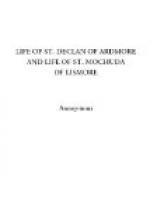26. As Patrick and the saints were in Cashel, i.e. Ailbe and Declan with their disciples, in the territory of Aongus Mac Nathfrich, they made much progress against paganism and errors in faith and they converted them (the pagans) to Christianity. It was ordained by Patrick and Aongus Mac Natfrich in presence of the assembly, that the Archbishopric of Munster should belong to Ailbe, and to Declan, in like manner, was ordained (committed) his own race, i.e. the Deisi, whom he had converted to be his parish and his episcopate. As the Irish should serve Patrick, so should the Deisi serve Declan as their patron, and Patrick made the “rann":—
“Humble Ailbe the Patrick of Munster, greater than any saying, Declan, Patrick of the Deisi—the Decies to Declan for ever.”
This is equivalent to saying that Ailbe was a second Patrick and that Declan was a second Patrick of the Decies. After that, when the king had bidden them farewell and they had all taken leave of one another, the saints returned to their respective territories to sow therein the seed of faith.
27. Declan and Ferghal Mac Cormac, king of the Deisi, with his army and followers, met one another at Indeoin and they made still more strong on the people the bond of Christian obligation. The king we have already mentioned, scil.:—Ledban, the recusant to the Christian name, was rejected of all and he came to nothing, leaving no knowledge (memory) of his history, as is written of the enemies of the faith:—“Their memory perisheth like a sound” [Psalm 9:7]. Moreover Declan and Fergal and the chief men of the Deisi decreed this as the place where the king of the Deisi should be inaugurated for ever thenceforward, because it was there Patrick and Declan blessed the king, Fergal; moreover tradition states that it was there the kings were crowned and ruled over the Deisi in pagan times.
28. At that time there broke out a dreadful plague in Munster and it was more deadly in Cashel than elsewhere. Thus it affected those whom it attacked: it first changed their colour to yellow and then killed them. Now Aongus had, in a stone fort called “Rath na nIrlann,” on the western side of Cashel, seven noble hostages. It happened that in one and the same night they all died of the plague. The king was much affected thereat and he gave orders to have the fact concealed lest it should bring disgrace or even war upon him, for the hostages




